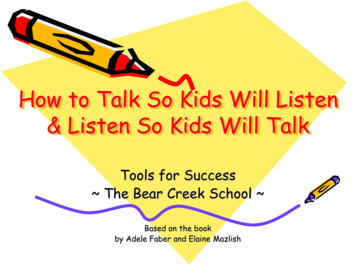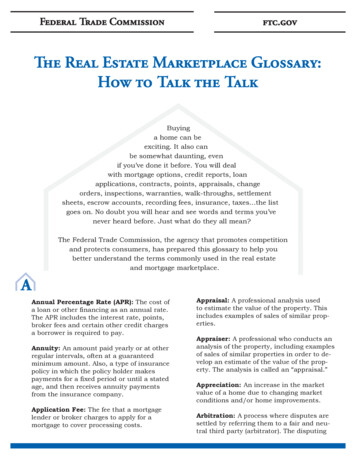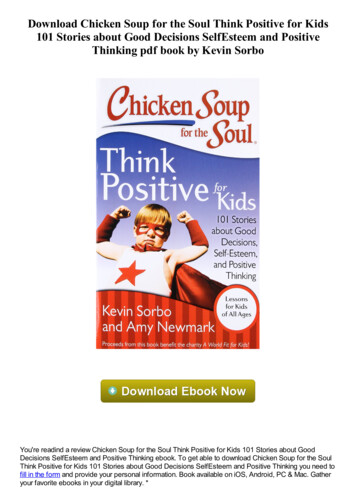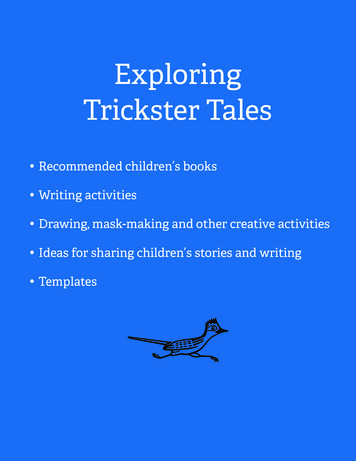
Transcription
How to Talk So Kids Will Listen& Listen So Kids Will TalkTools for Success The Bear Creek School Based on the bookby Adele Faber and Elaine Mazlish
1. Helping Children Deal with Their Feelings 2. Engaging a Child’s Cooperation 3. Encouraging Autonomy 4. Praise
Helping Children Dealwith their FeelingsChildren need to have theirfeelings accepted and respected.
Instead of HalfListening,
Listen with FullAttentionIt can be discouraging to tryto get through to someonewho gives only lip serviceto listening. It’s mucheasier to tell yourtroubles to a parent whois really listening. Hedoesn’t even have to sayanything. Often asympathetic silence is all achild needs.
Instead ofQuestions andAdvice,
Acknowledge witha word –“Oh Mmm I see”It’s hard for a child to thinkclearly or constructively whensomeone is questioning,blaming or advising her.There’s a lot of help to behad from a simple “Oh.umm.”or “I see.” Words like these,coupled with a caringattitude, are invitations to achild to explore her ownthoughts and feelings, andpossibly come up with her ownsolutions.
Instead of Denyingthe Feeling,
Give the Feelinga NameParents don’t usually give this kindof response, because they fearthat by giving a name to thefeeling, they’ll make it worse. Justthe opposite is true. The child whohears the words for what he isexperiencing is deeply comforted.Someone has acknowledged hisinner experience.
Instead ofExplanation andLogic,
Give a Child hisWishes in Fantasy When children wantsomething they can’t have,adults usually respond withlogical explanations of whythey can’t have it. Oftenthe harder we explain, theharder they protest.Sometimes just havingsomeone understand howmuch you want somethingmakes reality easier tobear.
Helping Children Dealwith their Feelings Listen quietly and attentivelyAcknowledge their feelings with a wordGive the feeling a nameGive the child his wishes in fantasyALL FEELINGS CAN BE ACCEPTED.CERTAIN ACTIONS MUST BE LIMITED.
Engaging CooperationWhat we do: Blame Name-call Threaten Lecture Compare
DescribeIt’s hard to do what needs to be done when people are telling you what’swrong with you. It’s easier to concentrate on the problem when someonejust describes it to you. When grownups describe the problem, it giveschildren a chance to tell themselves what to do.
Give InformationInformation is a lot easier to take than accusation. When children are giveninformation, they can usually figure out for themselves what needs to be done.
Say It With A WordChildren dislike hearing lectures, sermons, and long explanations.For them, the shorter the reminder, the better.
Talk About Your FeelingsChildren are entitled to hear their parents’ honest feelings. Bydescribing what we feel, we can be genuine without being hurtful.
Write A NoteSometimes nothing we say is aseffective as the written word.
Engaging a Child’sCooperation Describe what you see or describethe problem Give information Say it with a word Describe what you feel Write a note (sing a song?!) No emotional “hooks”
Encouraging Autonomy Toddlers and teenagers aren’t thatdifferent .
Let Children Make ChoicesThese are all choices that give a child valuable practice in making decisions. It must be very hard tobe an adult who is forced to make decisions about career, lifestyle, mate without having had agood deal of experience in exercising your own judgment.
Show Respect for a Child’s StruggleWhen a child’s struggle is respected, he gathers courageto see a job through by himself.
Don’t Ask Too Many QuestionsToo many questions can be experienced as an invasion of one’sprivate life. Children will talk about what they want to talkabout when they want to talk about it.
Don’t Rush to AnswerQuestionsWhen children ask questions, they deserve the chance toexplore the answer for themselves first.
Encourage Children to UseSources Outside the HomeWe want our children to know that they’re not completely dependentupon us. The world outside the home – the pet shop, the dentist, theschool, an older child – can all be called upon to help them with theirproblems.
Don’t Take Away HopeInstead ofpreparingchildren fordisappointment,let themexplore andexperience.By trying toprotect childrenfromdisappointment, weprotect them fromhoping, striving,dreaming, andsometimes fromachieving theirdreams.
To Encourage Autonomy Let children make choicesShow respect for a child’s struggleDon’t ask too many questionsDon’t rush to answer questionsEncourage children to use sourcesoutside the home Don’t take away hope
Praise and Self-Esteem1. Describe what you see.2. Describe what you feel.3. Sum up the child’s praiseworthybehavior with a word.
Descriptive PraiseInstead ofevaluating,describe whatyou see orfeel
Sum It up With a Word
How to Talk So Kids Will Listen& Listen So Kids Will TalkTools for Success The Bear Creek School
school, an older child –can all be called upon to help them with their problems. Don’t Take Away Hope Instead of preparing children for disappointment, let them explore and experience. By trying to protect children from disappointm










